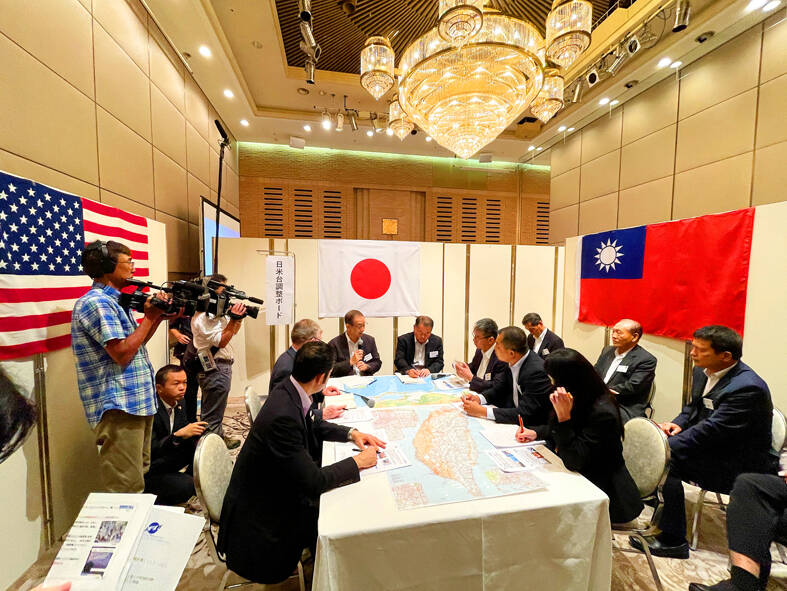Taiwan’s inclusion in a military simulation held on July 15 and 16 by the Japan Forum for Strategic Studies (JFSS) in Tokyo has significant implications for the nation’s role in regional security frameworks, retired air force lieutenant general Lee Ting-sheng (李廷盛) said on Tuesday.
The tabletop war game simulating a full-scale Chinese invasion of Taiwan featured the participation of analysts and retired high-ranking general officers from Taiwan, Japan and the US, said Lee, a participant and the deputy CEO of Institute for National Defense and Security Research (INDSR).
Last month’s event ended in a stalemate between the coalition of Taiwan, Japan and the US and attacking Chinese forces, which was the latest in a series of JFFS simulations rehearsing a war in the Taiwan Strait.

Photo: CNA
Being the most recent in a series of similar JFFS simulations, the event was also the first in the think tank’s history to include Taiwanese players.
The presence of Taiwanese experts and former officers — a first in the JFSS war game — has marked the nation’s entrance to the international arena, Lee said, adding that diplomatic personnel from Australia, Finland, Lithuania and the UK were present to observe the event.
Influence in Japan
Conclusions drawn from the war game would likely be worked into Tokyo’s policymaking, as a shuffle of the Japanese cabinet is expected in the second half of the year, he said.
Japanese House of Representatives member Itsunori Onodera and Kevin Maher, former director of the US Department of State’s Office of Japan Affairs, role-played the Japanese prime minister in the simulation, while Lai I-chung (賴怡忠) of Taipei-based Prospect Foundation role-played the Taiwanese president.
Eight retired general officers who served in the Japanese Self-Defense Forces took part in the simulation, exchanging views on the region’s strategic and economic situation with their Taiwanese counterparts, Lee said.
Lessons learnt
The potential for two nations’ distinct decision-making processes to cause coordination issues was highlighted in the exercise, INDSR assistant research fellow Yang Chang-jong (楊長蓉) said.
In addition, Taiwanese participants suggested their country could adopt the Japanese practice of incorporating international law considerations into strategic-level simulations, she said.
In the simulation, the Japanese government’s response to the conflict was calibrated by the legal requirements of the US-Japan Treaty of Mutual Cooperation and Security with regard to authorizing the use of US bases in Japan by Taiwan, she said.
The awareness of the roles the treaties could play in Tokyo’s military strategy was an important lesson, Yang said.

‘DENIAL DEFENSE’: The US would increase its military presence with uncrewed ships, and submarines, while boosting defense in the Indo-Pacific, a Pete Hegseth memo said The US is reorienting its military strategy to focus primarily on deterring a potential Chinese invasion of Taiwan, a memo signed by US Secretary of Defense Pete Hegseth showed. The memo also called on Taiwan to increase its defense spending. The document, known as the “Interim National Defense Strategic Guidance,” was distributed this month and detailed the national defense plans of US President Donald Trump’s administration, an article in the Washington Post said on Saturday. It outlines how the US can prepare for a potential war with China and defend itself from threats in the “near abroad,” including Greenland and the Panama

A wild live dugong was found in Taiwan for the first time in 88 years, after it was accidentally caught by a fisher’s net on Tuesday in Yilan County’s Fenniaolin (粉鳥林). This is the first sighting of the species in Taiwan since 1937, having already been considered “extinct” in the country and considered as “vulnerable” by the International Union for Conservation of Nature. A fisher surnamed Chen (陳) went to Fenniaolin to collect the fish in his netting, but instead caught a 3m long, 500kg dugong. The fisher released the animal back into the wild, not realizing it was an endangered species at

The High Prosecutors’ Office yesterday withdrew an appeal against the acquittal of a former bank manager 22 years after his death, marking Taiwan’s first instance of prosecutors rendering posthumous justice to a wrongfully convicted defendant. Chu Ching-en (諸慶恩) — formerly a manager at the Taipei branch of BNP Paribas — was in 1999 accused by Weng Mao-chung (翁茂鍾), then-president of Chia Her Industrial Co, of forging a request for a fixed deposit of US$10 million by I-Hwa Industrial Co, a subsidiary of Chia Her, which was used as collateral. Chu was ruled not guilty in the first trial, but was found guilty

The Chinese Nationalist Party (KMT) is maintaining close ties with Beijing, the Democratic Progressive Party (DPP) said yesterday, hours after a new round of Chinese military drills in the Taiwan Strait began. Political parties in a democracy have a responsibility to be loyal to the nation and defend its sovereignty, DPP spokesman Justin Wu (吳崢) told a news conference in Taipei. His comments came hours after Beijing announced via Chinese state media that the Chinese People’s Liberation Army’s Eastern Theater Command was holding large-scale drills simulating a multi-pronged attack on Taiwan. Contrary to the KMT’s claims that it is staunchly anti-communist, KMT Deputy